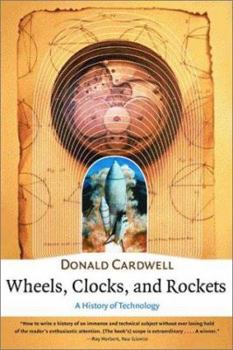Wheels, Clocks, and Rockets
Select Format
Select Condition 
Book Overview
As technology transforms our lives at an ever quickening rate, Donald Cardwell reminds us that technological innovation is not created in a vacuum--rather, it is the product of the successful interaction between social change, scientific developments, and political vision. In this wide-ranging, spirited (Booklist) survey of the machines and tools that humans have developed throughout history, Cardwell not only explains the mechanical technicalities but also delves into the underlying trends that have culminated in eras of great change. In particular, he highlights the eighteenth century as a watershed in the modern history of technology, analyzing how scientific developments in physics and chemistry spurred the mechanical innovations of the Industrial Revolution. From the steam engine to electrical power to nuclear energy to today's world of electronics and computers, this book opens a discussion of how science and technology together change our lives. Originally published as The Norton History of Technology.
Format:Paperback
Language:English
ISBN:0393321754
ISBN13:9780393321753
Release Date:May 2001
Publisher:W. W. Norton & Company
Length:592 Pages
Weight:1.20 lbs.
Dimensions:1.7" x 5.6" x 8.5"
Customer Reviews
2 ratings
Good depth, rather narrow scope
Published by Thriftbooks.com User , 22 years ago
The book's purpose is to cover the history of technology from pre-history to the modern times. In trying to do that, the book both suceeds and fails as follows:The good...Engaging language, depth of content and presentation. The author has a wonderful way of constructing his sentences and of drawing the reader into his subject matter. He doesn't just recite facts, instead he does a great job of explaining how, for example, Gutenberg invented printing by movable type, how Richard Arkwright came to develop his water frame machine for the textile industry, how James Watt's pumping engine worked, etc. Anyone who loves technology will be moved from the way he writes. The not so good...The book has a major concentration around the Industrial Revolution and 1700 to 1900 AD receives most of the book's treatment. The author on his preface explains why the book may seem to have "an undue emphasis on British experience," and in that, it does. Not much is said of the Chinese or Islamic contributions to the world's technology. All in all, the strength of this book is also its weakness. If one wants to read one short book about the Industrial Revolution, I can't think of a better one. For a more rounded introduction to the history of technology, however, one will need to look elsewhere. Arnold Pacey's "Technology in world civilization" puts technology in a global perspective and provides plenty of space to China, Turkey, India and Japan, though, by comparison, little about the Industrial Revolution. In a sense, then, the two books together should provide a nice global overview with minimal overlap. For a more detailed overview through 1900 AD, check out the 5 volume "A history of technology" by Charles Singer, E J Holmyard, A R Hall and Trevor Williams.
I gave this to my grandmother and she loved it
Published by Thriftbooks.com User , 23 years ago
My grandmother, a former teacher, is in her nineties and spends her days reading. I always give her books, usually history books, because of her fondness for teh subject. She has often told me about the experience of living through the twentieth century with its technological changes. I sent her this book and she loved it. She said that one of my uncles already has dibs on it when she is finished.






